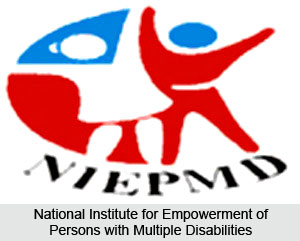 National Institute for Empowerment of Persons with Multiple Disabilities (NIEPMD) was established in the year 2005 in the city of Chennai in Tamil Nadu. The institute works under the Ministry of Social Justice and Empowerment, Government of India, to serve as a national resource center for empowerment of persons with Multiple Disabilities such as those with two or more disabilities in a person. The Disabilities enumerated as per PWD act, 1995 are Low Vision, Blindness, Locomotor Disability, Hearing Impairment, Mental Retardation, Mental Illness, Leprosy Cured Persons and as per The National Trust Act, 1999, are Cerebral Palsy and Autism.
National Institute for Empowerment of Persons with Multiple Disabilities (NIEPMD) was established in the year 2005 in the city of Chennai in Tamil Nadu. The institute works under the Ministry of Social Justice and Empowerment, Government of India, to serve as a national resource center for empowerment of persons with Multiple Disabilities such as those with two or more disabilities in a person. The Disabilities enumerated as per PWD act, 1995 are Low Vision, Blindness, Locomotor Disability, Hearing Impairment, Mental Retardation, Mental Illness, Leprosy Cured Persons and as per The National Trust Act, 1999, are Cerebral Palsy and Autism.
The Institute has the following main objectives:
* To undertake development of human resources for management, training rehabilitation, education, employment and social development of persons with Multiple Disabilities;
* To promote and conduct research in all areas relating to Multiple Disabilities;
* To develop Tran disciplinary models and strategies for social rehabilitation and to meet the needs of diverse groups of people with Multiple Disabilities;
* To undertake services and out reach programmes for the persons with Multiple Disabilities.
Thus, the National Institute for empowerment of Persons with Multiple Disabilities seeks to provide need based comprehensive rehabilitation through team approach facilitating inclusion, ensuring empowerment of persons with Multiple Disabilities and their families and by substantiating field based research and development of human resources. It wants to promote the quality of life for persons with Multiple Disabilities through equal participation of clients, families, professionals and community agencies. The major areas of responsibility of the Institute include Human resource development, Research and Development, Documentation & Dissemination of information, Developing Service delivery models, Supporting NGOs. Services provided include Early Intervention Services, Medical interventions, Physical therapy, Occupational therapy, Special education, Psychological interventions, Speech & Audio logy, Vocational training, Investigative procedures, Community & family Interventions and Genetic counseling. Family cottages are provided to families of clients from distant places for not more than one week. This service obviates the need for everyday commutation by persons with multiple disabilities, encourages the multiply disabled persons from all over the country to avail the services. It also helps to train the clients and educate the parents in a home-like atmosphere.
Among the courses offered by the Institute are- Masters in Rehabilitation Psychology, Graduate and Post Graduate courses in developmental therapy, B. Ed/ M. Ed (Multiple Disabilities), PG Dip. Early Intervention for children with Multiple Disabilities, Diploma in Special Education (Multiple Disabilities), Diploma in Community Based Rehabilitation. Short term course plans are available for Medical Doctors and other Health personnel, Mobility Instructors, Other Rehabilitation professionals and personnel, Primary School teachers, ICDS workers, Panchayat workers.




















